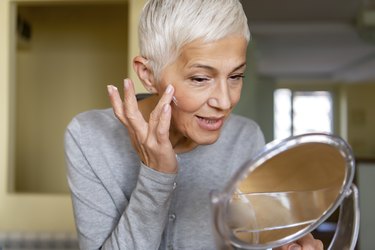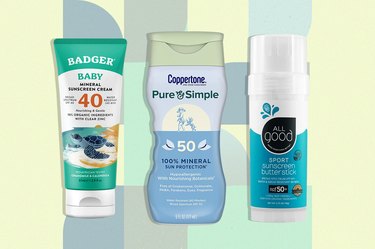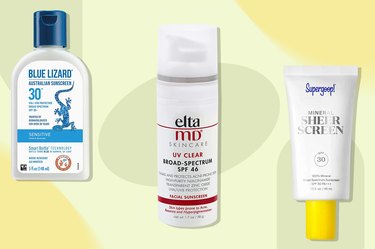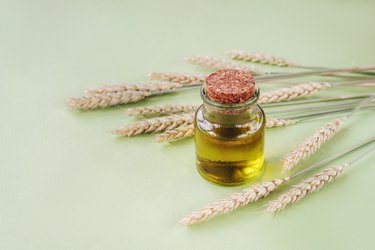
Having "thin skin" is not just a mindset — it's a reality as you age. You may look in the mirror and see more sagging skin, or lines that appear even when you're not smiling or frowning.
This is all completely normal as you add more candles to your birthday cake.
Video of the Day
Video of the Day
"'Skin thinning' is literally a noticeable decrease in thickness of the skin," says Shoshana Marmon, MD, PhD, dermatologist and director of clinical research in the department of dermatology at New York Medical College.
While thin skin can be caused by a variety of factors — both genetic and lifestyle — there are things you can do to restore skin's thickness and protect its plump.
Why Does Skin Get Thinner With Age?
So, what causes thin skin as you age? Here are four underlying factors:
1. Normal Skin Changes
Skin is made up of three layers: the epidermis (outer layer), dermis (middle layer) and subcutaneous (innermost) layer. Changes in each one can result in thinning skin, per the National Library of Medicine (NLM).
"In the epidermis, skin cell turnover slows with age, resulting in a thinner layer that is more susceptible to damage and dryness," Dr. Marmon says. Additionally, the production of collagen — a protein that provides support to the skin — decreases in the dermis, and the subcutaneous layer loses fat, too.
"As a result, aging skin can take on a paler, more translucent appearance," she adds.
2. Smoking and Alcohol Use
Smoking and drinking are two well-known habits that accelerate the signs of aging. An August 2019 review in The Journal of Clinical and Aesthetic Dermatology highlights that smoking is associated with deeper forehead and frown lines and crow's feet, and heavy drinkers are more likely to have less volume in their face, too.
3. Sun Exposure
It may feel great to be out in the sun, but those UV rays can do more damage than you think.
"Cumulative sun exposure is the greatest contributor to thin skin, Dr. Marmon says. "It damages your skin's collagen and elastin (another part of your skin's structure) fibers, leading to thinning, wrinkling and sagging."
A good way to understand this is by looking at the texture of your skin on your inner and outer forearm, Dr. Marmon says. The inner part sees less sun, so it's likely less wrinkled.
4. Menopause
People who go through menopause may experience a change in their skin due to hormonal changes.
"The drop in estrogen during the menopause transition markedly increases the loss of collagen and elastin," Dr. Marmon says. As a result, skin begins to thin.
Side Effects of Thin Skin as You Age
Thin skin is more than just a cosmetic issue. As the largest organ in your body, skin serves as your body's protective barrier to the outside world, per the NLM. So when it gets thinner, you may experience a few problems, including:
1. You May Bruise More
Thin skin bruises easily, according to the American Academy of Dermatology. On top of that, older adults are more likely to take medications that cause easy bruising, like blood thinners and anti-inflammatory drugs, and have vitamin deficiencies in B12, K and C, which can cause bruising, per the Cleveland Clinic.
If your skin is thin, it can't effectively protect you against bruising from accidents or falls.
2. Your Skin May Tear Easily
As opposed to thick, plump skin, which tends to be more resilient, thin skin is more fragile, Dr. Marmon says, which means it's easier to tear. And if you are on blood thinners, as mentioned above, you are more likely to bleed from even the smallest cuts, which can be dangerous.
Talk to your doctor if you experience skin that tears easily and you have other underlying medical conditions.
3. Healing May Take Longer
As a kid, you could scrape your knee and be fine the next day. But as you age, even a small scrape can take a longer time to heal.
Besides going through more bandages, wounds that take longer to heal can increase your risk for infection, Dr. Marmon says.
5 Tips for Strengthening Skin
Luckily, there are some at-home treatments and in-office procedures you can try to strengthen your skin and keep it healthy.
1. Use Sunscreen
Before heading out the door, don't forget your sunscreen, which should be applied to any and all areas of your body exposed to the sun.
Make sure you're putting sunscreen in places where skin thins easily, like the back of your hands and neck. Dr. Marmon also notes that your lips and under-eye area naturally have thin skin to begin with, so it's important to keep these protected, too.
Tip
Use a sunscreen with at least an SPF 30, per the AAD, and apply a topical vitamin C in the morning, which provides antioxidants that protect against UV damage, Dr. Marmon says. Make sure you apply the vitamin C before the SPF. While these products won't rebuild the skin, they can help slow skin thinning.
2. Apply a Topical Retinol
Retinoids and retinols are vitamin A derivatives, which can "increase collagen production and help skin become thicker and more supple," says S. Tyler Hollmig, MD, director of laser and cosmetic dermatology at Dell Medical School at The University of Texas.
While retinoids are stronger than retinols, they tend to cause dryness and irritation. It's best to have your dermatologist determine the best one for you based on your skin type. To minimize irritation, apply a pea-sized amount all over your face and follow up with a moisturizer.
Dermatologist-approved products to try include:
- Skinceuticals Retinol 0.5 ($88, skinceuticals.com)
- Skin Better AlphaRet Overnight Cream ($135, skinbetter.com)
- Paula's Choice Clinical 1% Retinol Treatment ($62, paulaschoice.com)
Tip
Start out using a retinoid or retinol once or twice per week, and slowly increase usage as your skin adjusts to the product.
3. Ask About Laser Treatment
One way to thicken skin is by increasing collagen production. Treatments that use lasers, such as Fraxel, work to do exactly that. These lasers work by "inflicting microscopic, controlled injuries to the skin in a way that stimulates a wound-healing response," Dr. Hollmig says.
As a result, skin naturally produces more collagen, and this can help reduce fine lines, wrinkles and age spots.
There are a number of procedure options out there, so talk to your dermatologist about your skin concerns and goals, and they can recommend the right one for you.
(Note: This is not a good treatment option if you have a weakened immune system or a connective tissue or autoimmune disease, per the Mayo Clinic.)
4. Consider Dermal Fillers
Injectable fillers "add volume to plump up thin skin," Dr. Marmon says. These are gel-like substances — such as hyaluronic acid found in Juvéderm, Restylane and RHA Collection — that target volume loss and lines and creases, per the American Board of Cosmetic Surgery (ABCS).
They're temporary, lasting between six months and two years, and can cost anywhere from $540 to $1,680, notes the ABCS.
Dermal fillers can be used to target cheeks, hands, the under-eye area and any deep creases in the skin, according to the AAD. Though there are a variety of places offering dermal fillers, the AAD notes the safest place to get this procedure is at the office of a doctor who specializes in these treatments, such as a dermatologist.
5. Get Vitamins and Minerals Through Food
Unfortunately, there are no special vitamins, minerals or other supplements (even collagen supplements) that have been proven to thicken the skin in a substantial way, Dr. Hollmig says.
Food, however, can offer some benefits, including those full of vitamins to help older adults with thin skin. Vitamins A, E and K can all help keep skin strong and healthy. Foods high in these vitamins include citrus fruits, broccoli, almonds and sunflower seeds, to name a few.
Dr. Hollmig says that good nutrition and healthy habits always matter, especially to support skin and keep it strong. "My recommendation is to protect your skin from the sun and eat a well-balanced diet," he says.
- The Journal of Clinical and Aesthetic Dermatology: “Impact of Smoking and Alcohol Use on Facial Aging in Women: Results of a Large Multinational, Multiracial, Cross-sectional study.”
- American Academy of Dermatology: “Caring for your skin in menopause.”
- American Academy of Dermatology: “Fillers: FAQs”
- American Board of Cosmetic Surgery: “Injectable Fillers Guide.”
- National Library of Medicine: "Skin Layers"
- Cleveland Clinic: "Do You Bruise Easily? When to Get It Checked Out"
- Fraxel.com
- Mayo Clinic: "Laser Resurfacing"
- juvederm.com
Is this an emergency? If you are experiencing serious medical symptoms, please see the National Library of Medicine’s list of signs you need emergency medical attention or call 911.





